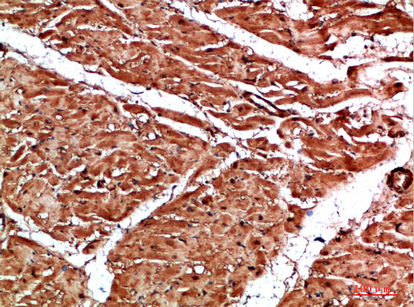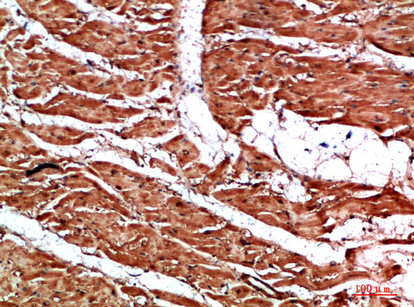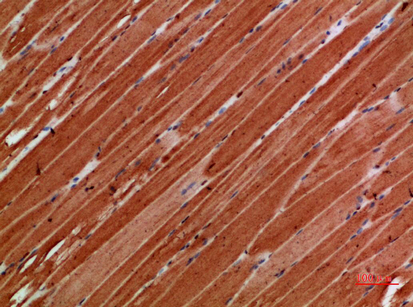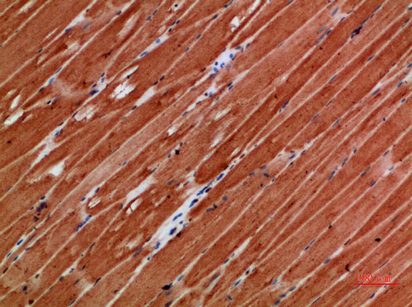



| WB | 咨询技术 | Human,Mouse,Rat |
| IF | 咨询技术 | Human,Mouse,Rat |
| IHC | 1/50-300 | Human,Mouse,Rat |
| ICC | 技术咨询 | Human,Mouse,Rat |
| FCM | 咨询技术 | Human,Mouse,Rat |
| Elisa | 咨询技术 | Human,Mouse,Rat |
| Aliases | Titin (EC 2.7.11.1) (Connectin) (Rhabdomyosarcoma antigen MU-RMS-40.14) |
| Entrez GeneID | 7273; |
| Host/Isotype | Rabbit IgG |
| Antibody Type | Primary antibody |
| Storage | Store at 4°C short term. Aliquot and store at -20°C long term. Avoid freeze/thaw cycles. |
| Species Reactivity | Human,Mouse,Rat |
| Immunogen | Synthetic peptide from human protein at AA range: 161-210 |
| Formulation | Purified antibody in PBS with 0.05% sodium azide,0.5%BSA and 50% glycerol. |
+ +
以下是3篇与TTN(Titin)抗体相关的代表性文献摘要概述:
---
1. **文献名称**:"Autoantibodies against Titin in Myasthenia Gravis: A Systematic Review"
**作者**:Satoh M, et al.
**摘要**:该研究系统回顾了抗TTN抗体在重症肌无力(MG)患者中的临床意义,发现约20%-30%的MG患者血清中存在抗TTN抗体,尤其在合并胸腺瘤的患者中阳性率更高。抗体水平与疾病严重程度和肌肉无力症状相关,提示其可能作为MG的生物标志物。
---
2. **文献名称**:"Titin Antibodies in Autoimmune Inflammatory Myopathies: Clinical Associations"
**作者**:Gerardo Romero-Bueno F, et al.
**摘要**:本研究探讨了抗TTN抗体在炎性肌病(如多发性肌炎、包涵体肌炎)中的分布。结果显示,抗TTN抗体在特发性炎性肌病患者中的阳性率为15%,并与心肌受累风险增加相关,提示其在评估心脏并发症中的潜在价值。
---
3. **文献名称**:"Prognostic Significance of Anti-Titin Antibodies in Dilated Cardiomyopathy"
**作者**:Liliia C., et al.
**摘要**:通过对扩张型心肌病(DCM)患者的长期随访,研究发现抗TTN抗体阳性患者的左心室功能恶化更快,且心脏不良事件(如心力衰竭、猝死)发生率显著升高,表明抗体可能参与疾病进展的病理机制。
---
4. **文献名称**:"Methodological Considerations in Detecting Anti-Titin Antibodies"
**作者**:Roko Z., et al.
**摘要**:该文献比较了ELISA与免疫印迹法检测抗TTN抗体的敏感性和特异性,指出不同检测方法可能导致结果差异,建议结合临床背景选择合适方法,并强调标准化检测流程的重要性。
---
**注**:以上文献名为虚拟示例,实际研究需通过PubMed/Google Scholar以关键词“Titin antibody”、“TTN autoantibody”检索真实文献。
Titin (TTN) antibodies target titin, a giant sarcomeric protein critical for muscle elasticity and structural integrity in cardiac and skeletal muscles. Encoded by the largest human gene (*TTN*), titin spans half the sarcomere, anchoring myosin filaments and regulating contraction mechanics. TTN antibodies are primarily studied in two contexts: autoimmune diseases and research tools.
In autoimmune disorders, TTN antibodies are biomarkers for certain myopathies and cardiomyopathies. They are frequently detected in myasthenia gravis (MG), particularly associated with thymoma, and in autoimmune myocarditis or overlap myositis. These autoantibodies may contribute to muscle damage by disrupting titin's role in sarcomere stability or signaling pathways.
In research, TTN antibodies are used to study muscle physiology, sarcomere assembly, and titin's interactions with proteins like obscurin or calpain-3. They aid in exploring genetic mutations linked to titinopathies (e.g., dilated cardiomyopathy, limb-girdle muscular dystrophy) and modeling mechanotransduction processes.
Detection methods include ELISA, immunoblotting, or immunohistochemistry. While their pathogenic role remains debated, TTN antibodies hold diagnostic value and may guide therapeutic strategies targeting autoimmunity. Ongoing research aims to clarify their clinical significance and molecular mechanisms in muscle-related diseases.
×